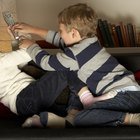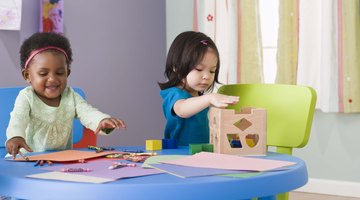How to Teach Toddler Not to Hit
If you have a toddler or have spent much time with one, chances are you’ve seen him hit someone. It could be you, another kid or even a family pet. It’s embarrassing, but it’s pretty normal for a little one this age to wallop someone at least once. Just because it’s normal, though, doesn’t mean that hitting is OK. With a little discipline and consistency, you can teach your toddler not to hit.
Why Do Toddlers Act Aggressively?
The toddler age is a trying time for both parents and kids.
Your little one is becoming more independent, wants to explore and is put into new situations more often.
Although she’s big enough to explore, she’s not quite big enough to communicate her feelings about new situations or use reason when she’s in a situation she’s unhappy with. So, one of the easiest things for her to do is communicate her feelings through actions, such as hitting and biting.
In addition to biting to express her feelings, your toddler might bite because she’s getting new teeth or just exploring with her mouth. She also might bite, though, because she wants to see what will happen. This is the age when she’s starting to understand cause and effect.
Usually, as your little one learns more words, she’ll bite less frequently. Biting is most common in children between the ages of 1 and 2.
Hitting is most common between the ages of 18 months and 2½ years old.
Consider the Situation
How to Get Toddler to Stop Hitting
Learn More
One of the first steps you can take to teach your toddler not to hit is to consider the situations he’s in when he hits.
Is it only when he’s in a certain play group and a playmate takes his toy? Maybe your little one can’t handle situations with lots of other toddlers in small spaces well. Find areas where your toddler can have more space and still enjoy some friends.
Is it right before nap time or a mealtime? Hungry kids can lose patience pretty quickly. Bring snacks or plan activities with others after he eats.
Also, consider whether any big changes have occurred in your little one’s life recently. Even small changes, such as a new room at his child care, can make your child feel upset and as if he has no control, which can lead to aggression.
Dealing With the Hitting
Regardless of whom your little one hits, your approach depends on the situation, not the person.
If your toddler does hit, the most important thing you can do is to stay calm. Take a minute or two to calm down, if possible; then deal with the situation. If you’re upset, it will likely just make your little one feel more upset.
Even though hitting is wrong, empathize with your little one.
Explain to her that you understand she’s frustrated, but it’s not OK to hit. Put words to the situation. For example, you might say, “I understand you want that toy, but you cannot hit your friend.” You might hold her hands firmly at her sides and say “no” or “stop,” so she associates keeping her hands down with what you’re saying.
After you stop her from hitting, give your little one a solution to the problem. For example, if she hit a friend because she wanted a toy, take her over to another toy. Tell her, “Let’s go play with this toy while we wait for our friend to finish playing with the other one.” Toddlers are easily distracted, and she’ll probably soon forget the toy she wanted when she finds another fun distraction.
Give your child a break if she’s in a situation that might seem overwhelming.
It might be hard for her to calm down if she’s in a room full of friends or relatives. Make it a comfy area with favorite books, stuffed animals or toys. When she does calm down, tell her what a wonderful job she did calming down.
If your toddler is at least 2 years old, you can use timeout as a consequence, but keep it short. Little ones younger than 2 don’t always understand the correlation between hitting and timeout.
You can also explain that hitting hurts.
Point out to her that her friend cried when she hit her because it hurt. Help her figure out a way to deal with her frustration if the situation comes up again.
It’s important not to hit your toddler back. This will only confuse your little one.
The key to any discipline with a toddler is consistency and praise. Once your toddler knows what happens when she hits, she’ll learn not to do it.
If the rules keep changing, you can’t expect your child to make good choices. On the other hand, when she does make good choices, praise her actions so she wants to repeat them.
Modeling Good Behavior at Home

How to Deal With a Child Who Won't Keep His Hands to Himself
Learn More
Another way to prevent hitting is to make sure your toddler doesn’t see aggression at home. If she constantly sees aggression, she’s more likely to use it when she’s in a frustrating situation.
Keep your actions in check when you’re disappointed, arguing with someone or frustrated.
If your little one has older siblings, make sure they model non-aggressive behavior as well. Encourage them to set a good example for their younger sibling.
Hitting Family Pets
If your toddler is hitting the family pet, it could quickly escalate into a dangerous situation. Dogs are unpredictable, and even the gentlest dog can snap when a pint-sized peanut is hitting him.
Use the same corrective technique you use when your child hits people when he hits the dog, but also show him how to pet Fido.
Show him how to gently stroke your pup and scratch his favorite spots.
If your dog is up for it, teach your little one how to play fetch or tug of war with your dog.
You can also try to find obedience classes that welcome kids, so your child learns to use gentle commands around your dog.
When your dog behaves well, give him a treat. Praise your little one when he treats the dog well.
Designate some spots around the house as safe zones for your pet.
These are areas where your dog can go when he’s had enough attention from your little one.
Tell your dog, “Go to your spot,” and point to the spot.
Once he goes, give him a treat. Repeat this over and over again until your dog understands.
Contacting Your Doctor
If your toddler continues to hit even after you have put in some consistent effort to correct the behavior, it might be time to contact your pediatrician. If his aggression interferes with his ability to interact with friends and family, and you’re hesitant to take him around others, a child development professional may be able to offer some guidance.









